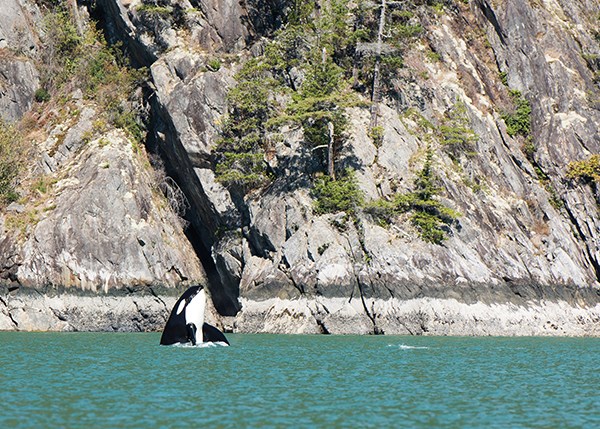Most of us are happy and supportive of the past decade or so of tentative gains made in restoring the ecological viability of Howe Sound, often a direct result of the work of John Buchanan and the Squamish Stream Keepers.
Any appearance of key iconic species, such as the orcas, is celebrated loudly in the news and on social media by all. What is perhaps under appreciated is the fact that these same orcas are dependant on a very specific food source – Chinook salmon.
It is understandable that many of us might react with some trepidation to any potential diminishment of a valued recreational resource, such as the Training Dike. What is not understandable, either logically or ethically, is to then engage in that peculiar human behaviour practiced to an art form whenever our special interests are threatened – denial.
If as we claim, we equally value the orcas, we better not hasten the extinction of our Chinook stocks, yet the prospect of altering the dike to do so is aberrant as well. This little problem has a name, loss aversion, which is a well-known irrationality that sabotages intelligent decision making, often by the paralysis of denial.
We all do it. It’s really quite common (think climate change) but invariably it comes back to bite our ass down the road. Fortunately, we have proved in the past that we can move beyond this paralysis.
Decades ago, the logging industry was a primary cause of salmonid decline but this is no longer so. It happened grudgingly at first, but eventually logging practices changed for the better. Now the primary problem is the Spit.
Chris Rollet states that the Squamish Windsport Society is a committee member of the Squamish Estuary Society, so none of this is a shocking surprise, yet perhaps he hasn’t adequately brought it to the attention of his membership. It may seem like a threat to some but perhaps it is more an opportunity to take stock of all our values and act appropriately.
John Buchanan merely broached this long and conveniently ignored subject, hopefully before it is too late. He suggested a range of options and he most certainly did not indicate “my way or the highway.”
This will be key, as evident from the comments from our mayor.
“Heintzman said the goal is to find a solution for all stakeholders in the area.
“Is there a creative solution here that gives us increased habitat, increased environmental resilience, but still meets some of the goals of the Windsport Society, of the deep sea port, of some economic development?” she said. “That is where we are striving towards now – figuring out how we can do that, together.”
If Washington State can see fit to decommission an entire dam to restore their Elwa river Chinook run, I’m sure Squamish can figure out this comparatively little problem of the Training Dike for the same purpose, especially if all relevant parties agree that such is needed.
Bruce Kay
Squamish



